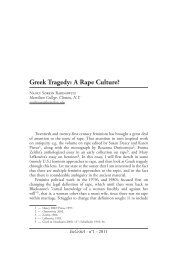Perspectives On and Of Livy's Tarpeia - EuGeStA
Perspectives On and Of Livy's Tarpeia - EuGeStA
Perspectives On and Of Livy's Tarpeia - EuGeStA
You also want an ePaper? Increase the reach of your titles
YUMPU automatically turns print PDFs into web optimized ePapers that Google loves.
196 TaRa WeLCh<br />
tate spem partus adimit. sed debebatur, ut opinor, fatis tantae origo urbis<br />
maximique secundum deorum opes imperii principium. vi compressa<br />
vestalis cum geminum partum edidisset, seu ita rata, seu quia deus auctor<br />
culpae honestior erat, Martem incertae stirpis patrem nuncupat. sed<br />
nec di nec homines aut ipsam aut stirpem a crudelitate regia vindicant:<br />
sacerdos vincta in custodiam datur, pueros in profluentem aquam mitti<br />
iubet (1.3.11-1.4).<br />
he (amulius) added crime to crime. he killed the male stock of<br />
his brother. as for his niece Rhea silvia, when he named her a vestal<br />
virgin (pretending it to be an honor) he took away from her hope of<br />
offspring through her perpetual virginity. But the origin of such a great<br />
city as ours was indebted to the fates, the origin <strong>and</strong> the beginning of the<br />
greatest empire after the resources of the Gods. When the vestal, having<br />
been taken by force, delivered twin sons, she named Mars as the father<br />
of her uncertain offspring, either because she believed it to be the case<br />
or because a divine instigator of her onus seemed more honorable. But<br />
neither gods nor men shielded the mother herself or the offspring from<br />
the king’s cruelty; the priestess was bound <strong>and</strong> sent into custody, <strong>and</strong> the<br />
boys he ordered to be thrown into the running river.<br />
Note in this episode two instances of the now familiar pairing of<br />
deception <strong>and</strong> the difficulty of seeming. first, amulius made Rhea silvia<br />
a vestal virgin under the guise of honoring her, but his aim was really to<br />
prevent her from producing Numitor’s heir. I draw attention to the fact<br />
that Rhea is a virgin precisely because amulius wanted to close off any<br />
possibility that she reproduce; he wanted extreme control over the ways<br />
the larger family would be open to expansion. Like the other women we<br />
have considered here, Rhea silvia “goes outside” to produce the first true<br />
Roman offspring. Livy speculates about Rhea’s naming of Mars as the<br />
twins’ father in a way that renders that paternity doubly suspect: either<br />
(Mars was or was not the father but) she thought it was so (seu ita rata);<br />
or (he was not the father, she knew he was not, but) she thought that<br />
naming him would lessen the burden of her culpability (seu quia deus<br />
auctor culpae honestior erat). This pair of possibilities is the first instance<br />
of “twinning” in the story about twins, <strong>and</strong> like the concept of twins it<br />
exploits the meeting point between similarity <strong>and</strong> difference. as further<br />
indication of Livy’s equivocation he calls the babies incertae stirpis. These<br />
phrases together suggest just how powerful (<strong>and</strong> dangerous) the woman is<br />
in opening up a society to newcomers through her ability to incorporate<br />
external bloodlines. exiled Romulus <strong>and</strong> Remus will turn out to have<br />
something regal in them that confirms, or at least suggests, their maternal<br />
regal heritage (aetatem eorum et ipsam minime seruilem indolem, 1.5.6),



